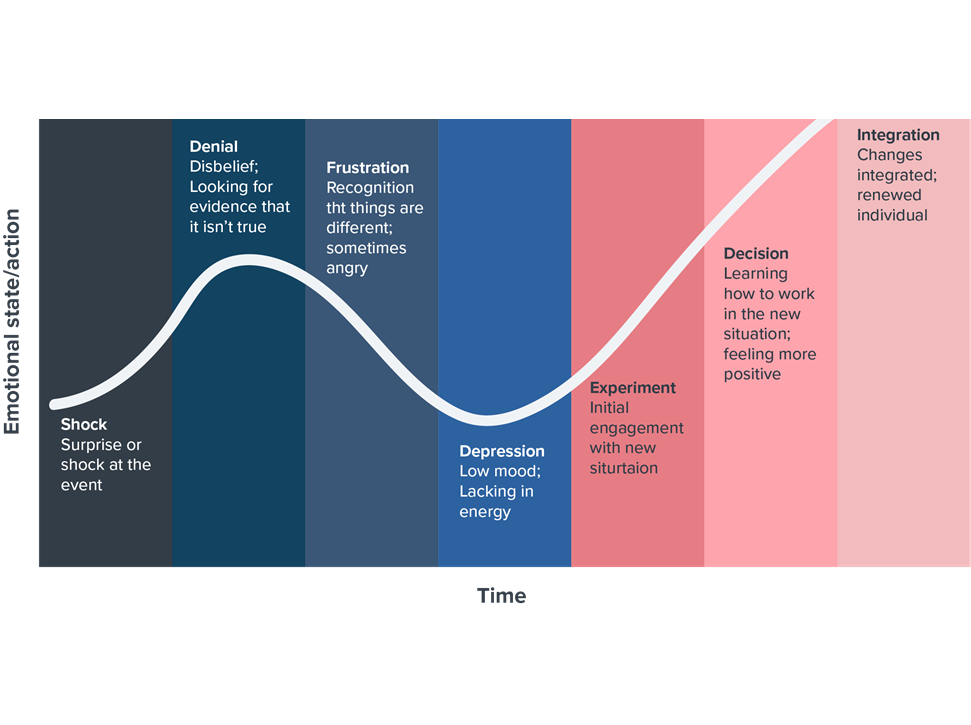You need to confirm you are over the age of 25 and living in Scotland
How to be adaptable
Read our tips to learn how to be open to things outside your comfort zone.
What you will learn
- Common changes you may face within your career journey
- How to adapt to these new changes
In today’s job market, change is inevitable. Many people rarely stay in the same job for life. You may experience, or be forced to consider, a change of job or career on more than one occasion throughout your working life. Whether it is beyond your control or your choice, changes in your career can happen for several reasons. How you adapt to these changes is what matters most. In this article we will guide you through some of the most common changes that you may encounter and how to adapt to them.
Recognising your feelings towards change
Everyone deals with change very differently. Where some thrive and adapt very quickly within their working life or career, others may take some time to get used it. Those who find change daunting or have a negative view may fail to make decisions that could potentially have positive outcomes. It is important to recognise your feelings when a change occurs. There is always a solution to a problem and the key to good stress management is to take control of the situation. Being in control of your feelings and focusing on the future is a great way to adapt to your situation whatever it may be.
The Change Curve
The Change Curve can help you to understand the process of change and how it can affect you emotionally. It shows how we feel when we are experiencing change and how we react to what is happening. Read our article 'Where are you on the Change Curve' to find out more.
Constantly reviewing your feelings can help you to use them positively throughout the changes in your working life. There may be occasions where the changes are something you did not expect, and it can have a knock on your confidence. This is always difficult to adapt to but understanding your feelings and turning to your circle of support for advice can be the key to finding solutions to the issues you are facing.
There are always opportunities out there and the more you challenge yourself to take on new tasks and activities the more confidence you will gain in your abilities. The most important factor is staying motivated and optimistic throughout each change and you will learn how to adapt more easily.
Adapting to common changes in your career
Changes can occur at any stage of your career. Whether the changes have a positive or a slightly negative influence on your current situation, it is important to remember that this is all part of your career journey. Your emotional response to these changes is completely valid and working through these emotional barriers will help you to reach your full potential.
There are common changes many of us go through within our careers. It can be reassuring knowing that people have already gone through the changes you are encountering, and that people have adapted, grown and gained success even after the most stressful situations. In your working life you may encounter some of these common changes:
-
Interviewing for a new position
Being invited for an interview is always a positive position to be in. It may be daunting at the time but it is important to remember you will have been selected out of a group of people for your skills, experience and character. Interview situations can always be a little stressful but you can prepare yourself prior to the interview by re-reading the job description, researching the company and practicing for any interview questions that may come up. Being prepared is hugely beneficial in adapting to the new situation. It is normal to be nervous in an interview and the person interviewing you will know this. Take some deep breaths and this should help you feel calmer.
-
Changing your role
You may be lucky enough to progress within your career, taking on a new position. You will be gaining further experience and adding new skills to your CV. Adapting to your new role may take some time but it is all a process, you will not know how to do everything in your first day, week or even month. Do not be afraid to ask questions, your new employer and colleagues will be happy to help. The more you ask the more you will learn and adapting will be simple. Reach out to people in your workplace and establish working relationships. Through getting to know the people you will be working with, you will start to feel more comfortable and confident in your situation.
-
Changing your work environment
Much like changing your role, being in a new working environment can be difficult to adapt to. Whether this is a new office with new colleagues and company culture, or working from home, it is a change you are not used to and can be a challenge. The first step in adapting to a new working environment is to establish where you will be working. Will you be working closely with people in your direct team? It is important when working in an office environment that you are accessible to the people you will work with and that they are accessible to you. Working next to or close with your team will encourage flow of discussion and establish a positive working environment. Are you working from home? It is crucial that you dedicate a space within your home to work from. This is always better if you can keep it away from somewhere you will be relaxing when you are not working, however this is not always attainable so try to take plenty of breaks away from your desk.
-
Time away from work
You may experience some time away from work for a variety of reasons, for example to care for a relative, or due to illness. You may be concerned that your skills and knowledge are out of date or even that ways of finding work have changed. Reaching out to a Skills Development Scotland adviser can give you the support needed to gain work experience or valuable training, so you can adapt to the changing job market.
You may be adapting to your return to work, which can take its toll. Don’t be afraid to reach out to your employer if you are struggling, they may be able to help you with your schedule or working environment. Take the time to catch up with your colleagues and learn about things you may have missed, being more aware of your situation can help you adapt to new processes or ease you back into your routine.
-
Redundancy
Redundancy can be unexpected and difficult to process. You will no doubt be going through a wide range of emotions and may not be sure how to deal with them. This is a major change in your life and support from others can help you use your feelings positively to move on to new opportunities. By getting in touch with an adviser via PACE (Partnership Action for Continuing Employment) we can work with you to discuss what options you have to gain new opportunities and progress in future.
Recognise how you have adapted already
The process of adapting to changes within your working life is not always easy but it is important to remember how far you have already come. You will have gone through many changes throughout your life and no matter how easy or difficult it was, you have always adapted and adjusted to new routines. Adapting comes with huge benefits, not only will you feel more comfortable in your current situation, you will also grow in confidence and skill. Experiencing change you may not have expected builds strength in character and although you may not realise it at the time, you will learn and grow by adapting.
In recent times, we have all had to adapt within our lives. COVID-19 has challenged some to adapt to working from home, become teachers to children and has even introduced new ways to communicate with friends and loved ones. It may not have been the easiest process, but we have all adapted and learned together. Supporting each other throughout changes can help us all to take on new situations in life or the workplace.
Some other articles you may find helpful
Where are you on the change curve?
By understanding the change curve journey and where you are on it, you can better understand your own emotions and behaviours.

